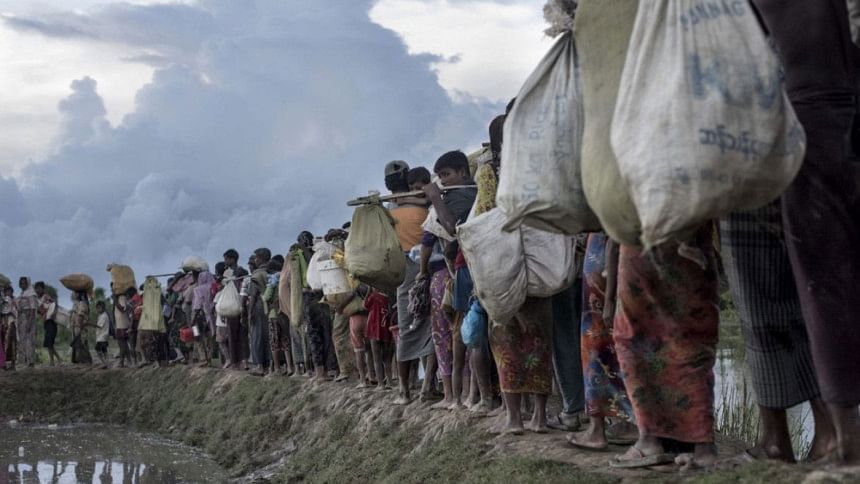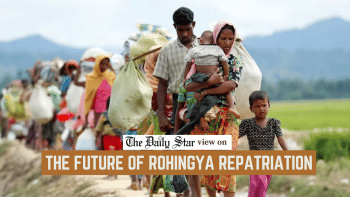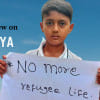Why Myanmar’s Rohingya repatriation plan rings hollow

Myanmar's recent announcement to repatriate 180,000 Rohingya refugees from Bangladesh has drawn international attention. But beneath this statement lies a familiar and troubling pattern. The declaration comes at a time when Myanmar is in deep political crisis, with widespread conflict, a collapsed administration, and worsening humanitarian conditions. Large parts of Rakhine State—home to the Rohingya—are now controlled by the Arakan Army (AA), while the military junta that issued the repatriation promise is steadily losing power and territory. Given these circumstances, it is hard to take this pledge seriously. It seems more like a political gesture to ease international pressure than a sincere effort to correct past wrongdoings.
This is not Myanmar's first repatriation attempt. Two major efforts in 1978 and 1992 followed large-scale violence that pushed hundreds of thousands of refugees into Bangladesh. In both cases, Myanmar agreed to take them back after strong international pressure. However, those returns were rushed, lacked oversight, and failed to address the core reasons why people fled. Returnees were denied citizenship, placed under strict restrictions, and treated with suspicion. These efforts did not lead to lasting peace but instead laid the foundation for further waves of violence and displacement.
The current situation is worse than in previous decades. Since the military coup in February 2021, Myanmar has been spiralling into chaos. The junta faces resistance from armed ethnic groups and civil movements across the country. The AA now controls key areas of Rakhine State. In many places, the military government no longer has the power to provide services, security, or even access. Under such conditions, how can they claim to guarantee a safe and voluntary return for the Rohingya refugees?
What makes matters worse is the lack of real policy change. The 1982 Citizenship Law—which stripped the Rohingya of citizenship—remains in place. There has been no formal apology, no legal reform, and no move to recognise them as an ethnic group in Myanmar. The same systems of exclusion and discrimination that forced them to flee still exist. Inside Myanmar, more than 100,000 Rohingya remain in internal displacement camps. Many have lived in these camps for over a decade with limited access to healthcare, education, and freedom of movement. Since the coup, access for aid groups has become even more restricted. Under such harsh and unsafe conditions, calling any repatriation "voluntary" or "dignified" is unrealistic.
The design of the current repatriation plan is also flawed. Myanmar has agreed to take back individuals listed between 2018 and 2020. However, many children have been born in the camps since then and are not included in these lists. This raises the serious risk of splitting families—where parents are allowed to return, but their children are not. Such situations violate basic humanitarian principles and the right to family unity. Understandably, many families would refuse to return under such conditions.
Another major issue is that the voices of the Rohingya themselves are not well-reflected in this process. Studies and interviews from the refugee camps in Cox's Bazar consistently show that most Rohingya do not want to return unless their demands are met. These include full citizenship, safety guarantees, the freedom to move and work, and access to education and healthcare. Many refugees say they would rather stay in Bangladesh than return to a country that still refuses to recognise them.
Bangladesh, meanwhile, has carried a massive humanitarian burden since 2017. Nearly one million Rohingya live in camps along its border. International funding has declined, and frustration is growing among local communities and officials. It is understandable that Bangladesh seeks a solution. However, agreeing to a flawed repatriation plan that lacks guarantees of safety and rights could put vulnerable people at risk, retraumatise survivors, and increase instability in both Rakhine and the camps in Bangladesh. For any future repatriation to work, several key steps must be taken.
First, Myanmar must change its laws to grant the Rohingya full citizenship. This means repealing or amending the 1982 Citizenship Law and recognising the Rohingya as an official ethnic group. Without this, any return will simply recreate the same injustices. Second, international organisations like the United Nations High Commissioner for Refugees (UNHCR) and the International Organization for Migration (IOM) must be involved at every stage—from verifying returnees and ensuring safe transport to monitoring their reintegration. Independent oversight will help build trust and protect the rights of returnees.
Third, repatriation must include full families. It is unacceptable to separate children from their parents or leave out newly born members of a household. Repatriation should be a family-centred process based on dignity and choice. Fourth, the return process must be part of a broader justice effort. Myanmar must acknowledge the crimes committed against the Rohingya, hold perpetrators accountable, and offer reparations to victims. Justice is not just about punishment—it is about creating conditions where trust can be rebuilt and people feel safe in their own country. Finally, returnees must be supported with long-term reintegration plans. They need access to education, healthcare, housing, jobs, and land. They should not be sent back to camps or temporary shelters. They must be treated as full and equal citizens with rights and opportunities.
Myanmar's latest repatriation promise may sound hopeful on the surface, but it fails to address the real causes of displacement. The country's worsening political crisis, unchanged discriminatory laws, and lack of accountability all suggest that this initiative is not about helping the Rohingya—it is about managing Myanmar's international image. Unless deep structural changes are made and the rights of the Rohingya are restored, repatriation will remain a false promise. The international community must not accept empty gestures. It must demand real reform, legal guarantees, and a rights-based approach to any return plan. Anything less than that is not repatriation—it is re-victimisation. For the Rohingya, who have suffered for generations, only a just and safe return can bring an end to their long journey of displacement.
Dr Md Nuruzzaman Khan is research fellow at the University of Melbourne, Australia. He can be reached at [email protected].
Views expressed in this article are the author's own.
Follow The Daily Star Opinion on Facebook for the latest opinions, commentaries and analyses by experts and professionals. To contribute your article or letter to The Daily Star Opinion, see our guidelines for submission.

 For all latest news, follow The Daily Star's Google News channel.
For all latest news, follow The Daily Star's Google News channel. 










Comments